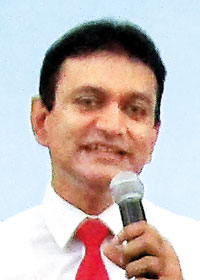News
National COVID-19 Positive Hospital for Psychiatric Patients in Udagama-Atabage closed
A very vulnerable group of people pushed further into oblivion – causing much concern among many healthcare staff.
The very first National COVID-19 Positive Hospital for Psychiatric Patients set up in hilly Udagama, Atabage, eight kilometres from Gampola which opened its welcoming doors for patients on July 30, last year (2021) is now shut.
The Sunday Times on August 8, last year (2021) exclusively reported this boon for vulnerable patients in an article headlined ‘Not forgetting the mentally handicapped in these times of COVID’ and how the Sri Lanka College of Psychiatrists faced many a challenge to set it up with the ready support of the Health Ministry.

Dr. Gihan Abeywardena
By December all this toil and trouble had come to naught. It was at the college’s sessions held recently that the live-wire behind this hospital project and college President Dr. Gihan Abeywardena spotlighted that this hospital had been closed.
First came the good news from Dr. Abeywardena that the college pioneered the opening of the first-ever specialised hospital with 18 separate rooms for COVID positive psychiatric patients with 18 separate rooms. This is because mentally-ill COVID-19 patients were being rejected or ill-treated by many COVID-19 treatment centres which the college noted with “serious concern”.
He was appreciative of the Health Ministry’s Deputy Director-General of Non-Communicable Disease (DDG-NCD), Dr. Champika Wickramasinghe who had managed to mobilise Rs. 15 million from the ministry to upgrade this abandoned hospital to manage infectious people.
“The college managed to get a donation of several lakhs from Sri Lankans living in Australia to buy necessary equipment for the patients. This specialised hospital catered to mentally ill patients from all over the country ranging from Ratnapura and Trincomalee to Batticaloa and had managed to care for 33 patients without anyone dying,” he said.
Then came the bad news from Dr. Abeywardena that “unfortunately this has been closed unilaterally by the regional health authorities of the Central Province, without reportedly informing the ministry or the college. This has deprived the opportunity for the mentally ill COVID positive patients to get treatment in dignity and comfort and sadly, the centre remains unutilised”.
Referring to the college’s “unorthodox” theme for the sessions, ‘Psychiatry beyond borders’ he went onto say that they had invited quite a few non-psychiatrists to address them as they have noticed at times that psychiatrists tend to get isolated, where specialised psychiatric hospitals exist away from the mainstream hospitals, limiting interactions. Efforts should be made to improve correlation with other specialists to usher in holistic care to the mentally deprived.
Amidst numerous uncertainties and obstacles of the pandemic, the college had carried out much work. It included actively engaging in the mental health burden of the pandemic.
It had collaborated with the Asia Foundation to assist frontline healthcare workers in ensuring their mental wellbeing.
An illustrated trilingual booklet on ‘Psychological wellbeing during the COVID crisis: a guide for healthcare workers’ had been published, while posting self-care messages on social media for frontliners to boost their self-esteem and keep themselves motivated to continue their good work.
Healthcare workers had 24-hour access to the hotline operated by the college.
Among many other important achievements, Dr. Abeywardena had also focused on how the college took “serious note” of actions by some police officers who indiscriminately arrested chronically mentally ill patients loitering on the streets and reprimanded them.
“They subsequently get imprisoned for months, harshly treated by prison officials, which in turn leads to exacerbation of their mental illnesses,” he said, adding that the college initiated training programmes for police and prison officers on common psychiatric issues in forensic settings.
The importance of seeking psychiatric help rather than arresting them had also been highlighted by effectively enacting dramas and interactive workshops.

First National COVID-19 Positive Hospital for Psychiatric Patients set up in Atabage
The best way to say that you found the home of your dreams is by finding it on Hitad.lk. We have listings for apartments for sale or rent in Sri Lanka, no matter what locale you're looking for! Whether you live in Colombo, Galle, Kandy, Matara, Jaffna and more - we've got them all!

